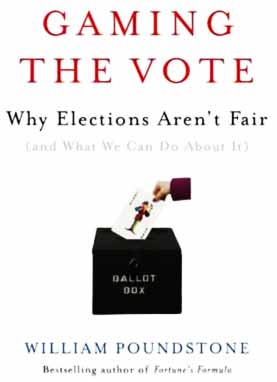GAMING THE VOTE
Why Elections Aren’t Fair (and What We Can Do About It)
At least six U.S. presidential elections have been won by the second most popular candidate, but these results were not inevitable. In five of the cases, and possibly the sixth (Clinton v Trump), the vote was upset by a “spoiler” ― a minor candidate who took enough votes away from the most popular candidate to tip the election to someone else. The spoiler effect arises not from any election fraud, but from the nature of our election system itself. In fact, one of the most surprising intellectual discoveries of the twentieth century, the “impossibility theorem” of the Nobel laureate economist Kenneth Arrow, asserts that all voting systems have flaws which can be exploited so that a less favored candidate will beat a more favored one. This result has not been lost on today’s political consultants. Armed with polls, focus groups, and smear campaigns, political strategists exploit the fundamental flaws in majority voting to regularly win elections for the less-popular candidate. Some argue that the answer to the spoiler effect lies in ranked-choice (“instant run-off”) voting, while others argue that ranked-choice voting will not eliminate the flaws in our voting system but that, say, the less well-known method of range voting will. In Gaming the Vote, William Poundstone covers these alternatives and more, assessing the obstacles confronting any attempt to improve the U.S. electoral system.
You can download pdfs of the book’s chapters by using the links to the right. Or you can read the book online without downloading it by using the links below.
front matter – table of contents
Ch 0 – Prologue: The Lizard and the Wizard
THE PROBLEM
Ch 1 – Game Theory
Ch 2 – The Big Bang
Ch 3 – A Short History of Vote Splitting
Ch 4 – The Most Evil Man in America
Ch 5 – Run, Ralph, Run!
Ch 6 – Year of the Spoiler
THE SOLUTION
Ch 7 – Trouble in Kiribati
Ch 8 – The New Belfry
Ch 9 – Instant Runoff

PDFS for GAMING THE VOTE
Gaming the Vote – Prologue
Gaming the Vote – Chapter 1
Gaming the Vote – Chapter 2
Gaming the Vote – Chapter 3
Gaming the Vote – Chapter 4
Gaming the Vote – Chapter 5
Gaming the Vote – Chapter 6
Gaming the Vote – Chapter 7
Gaming the Vote – Chapter 8
Gaming the Vote – Chapter 9


